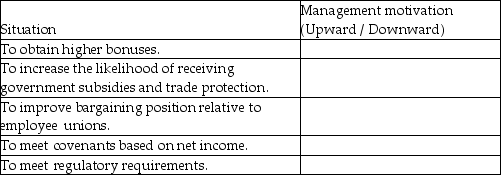Exam 1: Fundamentals of Financial Accounting Theory
Exam 1: Fundamentals of Financial Accounting Theory33 Questions
Exam 2: Conceptual Frameworks for Financial Reporting60 Questions
Exam 3: Accrual Accounting159 Questions
Exam 4: Revenue Recognition110 Questions
Exam 5: Cash and Receivables120 Questions
Exam 6: Inventories156 Questions
Exam 7: Financial Assets141 Questions
Exam 8: Property, Plant, and Equipment127 Questions
Exam 9: Intangible Assets, Goodwill, Mineral Resources, and Government Grants81 Questions
Exam 10: Applications of Fair Value to Non-Current Assets120 Questions
Select questions type
For the situations described below, explain whether managers would be motivated to manage earnings, assets, and equity upward and liabilities downward, or alternatively, managers may be motivated to manage earnings, assets, and equity downward and liabilities upward.

(Essay)
4.9/5  (38)
(38)
Management motivation to increase the likelihood that the company will receive a $50,000 government rebate best illustrates which of the following?
(Multiple Choice)
4.8/5  (31)
(31)
Explain the meaning of publicly accountable enterprises, efficient securities market (semi-strong form), and efficient securities market (strong form).
(Essay)
4.8/5  (40)
(40)
Which of the following statements is correct about financial information?
(Multiple Choice)
4.9/5  (43)
(43)
Why is the efficient securities market hypothesis important for accounting?
(Multiple Choice)
4.7/5  (40)
(40)
Discuss two ways in which a shareholder can mitigate the problem of moral hazard when investing in a company.
(Essay)
4.9/5  (35)
(35)
Discuss three reasons why it is important to understand accounting theory.
(Essay)
4.8/5  (31)
(31)
Which statement appropriately explains the meaning of "publicly accountable enterprise"?
(Multiple Choice)
4.9/5  (28)
(28)
Showing 21 - 33 of 33
Filters
- Essay(0)
- Multiple Choice(0)
- Short Answer(0)
- True False(0)
- Matching(0)